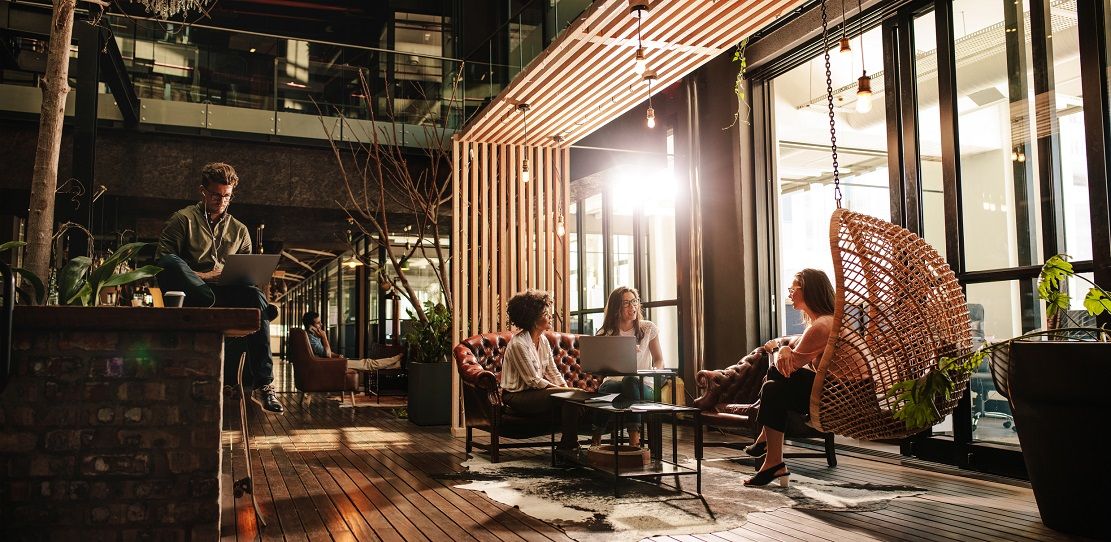Coworking is making a huge impact on the commercial real estate industry.
Coworking companies like WeWork are some of the largest lessees of office space in Manhattan. Newer coworking companies such as Industrious and Knotel are growing by leaps and bounds. Coworking restaurant firms like KettleSpace and WEach Seats are helping restaurants turn space that sits vacant most of the day into new profit centers.
Coworking Hotels Are the Newest Trend in the Hospitality Industry . . . and in Town
Hotels are rewriting their business models and combining hotel and coworking spaces. Lobbies in hotels are becoming more coworking-friendly, positioned for both business travelers and local coworking users. Business centers are being transformed into coworking spaces with shared and common areas, stylish décor, and comfortable sofas and floor cushions.
Space used in hotels for coworking is a win-win for the hotel and for the coworker. Coworking space is used during weekday morning and afternoons, which are off-peak times for hotels. During the evenings and weekends – the peak times for hotels – coworking space isn’t used. Just as with restaurant coworking, coworking hotels are able to use underutilized space more efficiently and profitably.
Three Different Variations in Coworking Hotels
There are three different variations to the coworking hotel concept:
- Coworking space in hotels is integrated into the hotel’s main lobby. This social center offers large designated work tables and space adjacent to lounges where coworkers can relax and enjoy a drink when the workday is done.
- Hotel coworking space can also be integrated into the same building as the hotel. The hotel and coworking space are branded uniquely and operate individually while sharing the same facility.
- Hotels that already have a strong hospitality image may create their own coworking brand. They share services and facilities in the same building with both brands integrated under the same business umbrella.
Coworking Isn’t a Good Match for Every Hotel
The existing brand and target market of the hotel both play a major role in determining if hotel coworking makes sense.
Mid-range 3- and 4-star hotels with a strong brand image that are located in city business districts are finding that offering coworking space makes good business sense. These hotels have existing communal space and a business character making it easy for the hotel to facilitate coworking space.
On the other hand, 5-star luxury and leisure hotels usually don’t make good choices for coworking hotels. While the hotel brand is strong, there’s too much of a disconnect between the existing high-end image of the luxury hotel and the change in perception that coworking space creates.
How Coworking Hotels Are Good for Business
Over the next few years, mobile workers will make up more than 70% of the workforce in the U.S., according to a recent study by International Data Corporation. That’s more than 105 million people, and coworking hotels are poised to capture their share of this growing market.
There are several reasons why coworking hotels are a long-term trend that’s good for business:
- Coworking lounges in hotels provide new places for smaller meetings that freelancers, solopreneurs, and start-up coworking users need – customer segments that most hotels aren’t currently attracting.
- Coworking hotel space gives users a welcome alternative to the traditional impersonal business center found in many hotels which helps the hotel attract additional business.
- Hotel coworking spaces blur the line between working and playing by offering both business travelers and local coworking customers access to the hotel’s lounge, restaurant, and nightlife that’s right on site.
- Coworking space in hotels creates a new revenue stream by offering coworking space on demand to local businesses looking for a unique office environment or an alternative space for meetings.
- Dedicated coworking space in a hotel allows users to network and socialize instead of using an isolating guest room desk. This also helps build brand loyalty and reservation growth.
Four Hotels that Have Mastered the Hotel Coworking Trend
Coworking hotels are changing the character of the hospitality industry.
Business travelers are discovering that coworking hotels make working on the road easier. Local coworking users are learning that networking is easier in the high-tech attractive space that hotel coworking provides.
Here are four coworking hotels that have mastered the coworking trend by offering the perfect blend of business, recreation, and hospitality:
- Eaton Workshop in Washington, D.C., targets the media, nonprofits, and art coworking community with guest lounges, shared coworking areas, and a library filled with books from a local social justice nonprofit;
- Mama Shelter has locations in Europe and South America, in addition to coworking space in Los Angeles, and offers Wi-Fi in a loft-like coworking lounge, executive suites, and meeting space for up to 40 people;
- Selina services include coworking space in Miami and in 25 other locations throughout Latin America, providing users with dedicated desks, meeting tables, and communal coworking hotel space;
- The Assemblage, located in the Financial District of Manhattan, has communal tables, floor cushions, comfy sofas, and semiprivate nooks to match the coworking space user’s every mood.









